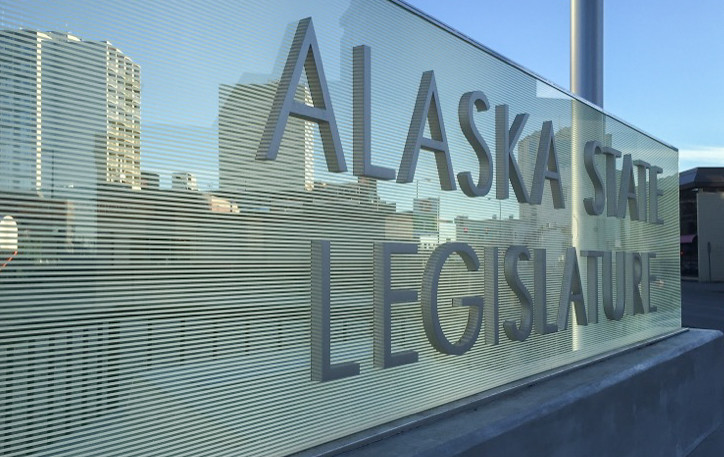
Southeast Alaska leaders and residents last week testified for restoration of state funding cuts and in some cases additional state money to make up for a loss of federal funding. Those were some of the voices heard by the Alaska House finance committee as it considers a state operating budget for the upcoming year.
Many voices and letters from across the state are asking legislators to make up for a loss of federal funding for organizations that provide help to victims of domestic violence and sexual assault.
Alaska’s Council on Domestic Violence and Sexual Assault has informed organizations around the state to expect a 30-33 percent reduction in grant programs
Natalie Wojcik is executive director of Sitkans Against Family Violence and said that would mean a 230,000 dollar cut for her organization.
“We’ve had to start looking at what difficult choices we have to make,” Wojcik said. “If we are to endure the full 30 percent cut, we are looking to cut our legal advocacy services to victims in half, reduce on-call advocacy for the shelter and sexual assault response and entirely cut our childrens’ programming. I’m reaching out to let you know what is happening and the dire consequences it will have not only on Sitka, but the entire state.”
Domestic violence victims organizations asked for lawmakers to budget state general fund dollars to make up for the lost federal dollars.
Sarah Hanson-Hofstetter is a board member of Working Against Violence for Everyone, or WAVE in Petersburg.
“If WAVE loses 30 percent funding, the cuts will have devastating impacts on survivors, victims, their families and the community work WAVE is conducting,” Hanson-Hofstetter said.
The statewide council is also seeking a federal fix or emergency aid to cover that funding cut but it’s not likely that would be in place in time for the fiscal year that starts in July.
Lawmakers also heard from representatives of municipalities and non-profits seeking restoration of state funding that the governor has vetoed from the budget in the last few years.
Melissa Henshaw, public and government relations director for the city and borough of Sitka, urged legislators to fund reimbursement for school bond debt and other payments to municipalities.
“The state’s proposed budget is half the original commitment for a loss to Sitka of over 1.6 million dollars. We ask for your support for the community assistance program, that has decreased by more than half from 2015 in which over 900,000 was budgeted. For fiscal year 2022, the state’s proposed budget is $415,000 to Sitka.”
Ketchikan Gateway Borough mayor Rodney Dial testified his community has lost over 200 million in economic activity and residents there are facing high unemployment and major increases in living costs.
“So with all that going on, it becomes easy to see that our citizens need local government help more than even, but our ability to provide that help has been greatly diminished by our tax revenue, as they have cratered,” Dial said. “So for that reason we desperately need the state to honor its commitment regarding programs like school bond debt reimbursement. I completely understand the state’s fiscal condition. However, canceling debt reimbursement was a discriminatory action that only impacted the organized boroughs of the state.”
The state had reimbursed municipalities up to 70 percent for school and other projects. Governor Dunleavy vetoed half of that money in 2019 and all of it in 2020, with the legislature not voting to override that veto.
Dial also asked for restored funding for community assistance payments to cities and boroughs as well as adequate state funding for the Alaska Marine Highway System.
Helen Clough of Juneau told lawmakers that inconsistent and unreliable service is a death knell to the ferry system.
“You guys have got to find a way to increase funding and provide several things, number one improved, consistent maintenance, some long-term funding for replacement vessels, use of marine highway staff when appropriate to do maintenance and repairs rather than sending off to shipyards and finding some way to have at least two vessels always operating in Southeast so that there is redundancy so in the case of a breakdown people’s cars aren’t stranded forever,” Clough said.
She thought a strong ferry system would bring many independent travelers to the state this summer and fill a gap left by the loss of large cruise ships.
Tom Brice of Juneau, a University of Alaska Fairbanks alum, urged a plan to stop the bleeding of funding for the university.
“The university is a tool that will generate our engineers, teachers and health care professionals for our state’s future, maybe even a few politicians,” Brice said. “Coordinated efforts to cross track COVID relief and infrastructure dollars with real needs the university is facing now can help divert limited general fund dollars back into the classroom to stabilize those needs.”
Others testified for reinstatement of state support for public radio, against cuts to Division of Motor Vehicles offices and flat funding for school districts.
The committee had public testimony scheduled from around the state into the weekend as it drafts the state’s operating budget for the new fiscal year that starts in July.
(Editor’s note: this story has been corrected for the name of the Division of Motor Vehicles.)











